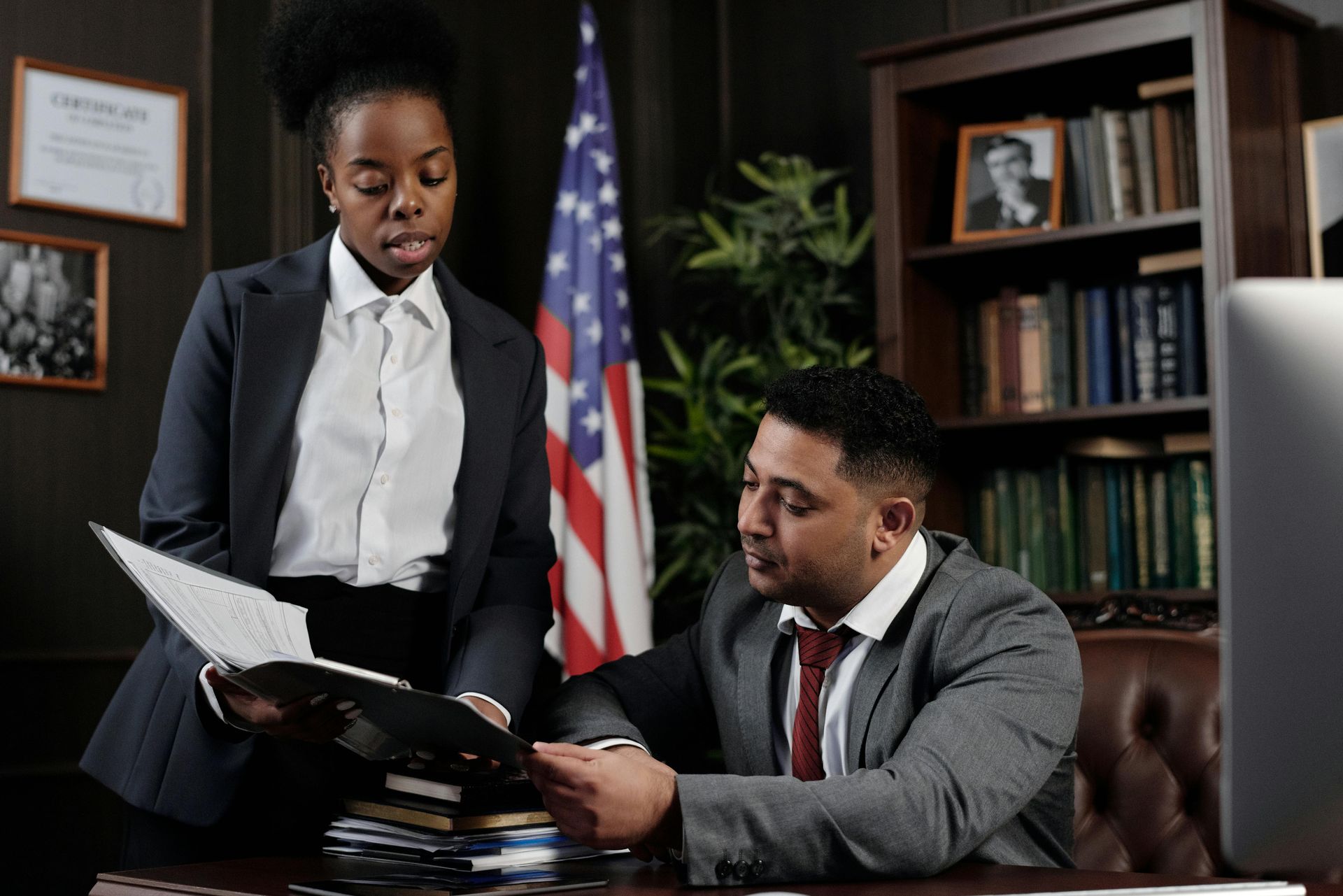Requisito de Solicitação de Condição de Trabalho para Petição H-1B
Santos Lloyd Law Team • March 23, 2023

Click here to read this article in English
O visto H-1B
permite que uma empresa dos EUA empregue temporariamente um cidadão estrangeiro nos EUA de forma não imigrante (isso significa visto de trabalho temporário) em uma ocupação especializada. Uma ocupação especializada requer aplicação teórica e prática de um corpo de conhecimento especializado e um diploma de bacharel ou equivalente na especialidade específica. O número máximo de anos que um cidadão estrangeiro pode possuir um visto H-1B é de seis (6) anos.
Para uma empresa dos EUA enviar uma petição H-1B, o empregador dos EUA deve preencher uma Aplicação de Condição de Trabalho (LCA). Antes que a empresa dos EUA possa enviar um LCA, a empresa dos EUA deve verificar seu número FEIN com o Departamento do Trabalho antes de registrar um LCA. Se a empresa dos EUA tiver verificado seu FEIN no passado, não será necessário verificar seu número FEIN novamente.
Após a empresa dos EUA verificar seu número FEIN, a empresa dos EUA deve enviar o Formulário de Condição de Trabalho (Formulário ETA-9035) ao Departamento do Trabalho eletronicamente por meio do sistema FLAG. No momento em que a empresa dos EUA está preenchendo seu LCA, ela deve atestar o cumprimento dos requisitos do programa de visto H-1B. É importante observar que os LCAs não podem ser enviados mais de 6 meses antes da data de início do emprego.
Ao registrar um LCA, a empresa dos EUA deve incluir:
- Duração do cargo (o tempo máximo é de 3 anos)
- Número de funcionários para o cargo
- Cargo e Código SOC
- A localização do cargo (deve incluir todos os locais de trabalho se estiver trabalhando em vários locais de trabalho)
- Confirme se a posição é período integral ou meio expediente
- Salário oferecido para o cargo (seja o salário vigente ou acima do valor do salário vigente)
- Informações da empresa nos EUA (incluindo endereço da empresa, número de telefone, endereço de e-mail e nome completo do signatário da empresa)
Depois que o LCA é arquivado no Departamento do Trabalho, ele deve ser certificado em 7 dias úteis. É importante que o empregador mantenha um arquivo de Arquivo de Acesso Público (PAF) preciso.
Por favor, agende uma consulta com um de nossos experientes advogados de imigração para discutir os requisitos e o processo do H-1B.
Este blog não se destina a ser um aconselhamento jurídico e nada aqui deve ser interpretado como estabelecimento de uma relação cliente-advogado. Por favor, agende uma consulta com um advogado de imigração, antes de agir baseado em qualquer informação lida neste blog.
Similar Posts

A key development occurred in December 2024, when the deference policy was officially written into regulation (the “H-1B modernization rule”), set to take effect on January 17, 2025. Once it takes effect, USCIS adjudicators must apply the deference policy to extension requests involving the same employer, the same employee, and the same job details. USCIS can still decide not to defer to the previous approval if: There was a material error in the earlier approval. There has been a material change in circumstances or eligibility. New information raises doubts about eligibility. Even in these situations, officers must explain why they are not deferring. Importantly, USCIS does not have to defer to decisions made by other agencies, such as the U.S. Department of State or Customs and Border Protection. By turning the deference policy into a regulation, it becomes more difficult for future administrations to eliminate it quickly. Any attempt to rescind or change the policy now requires a lengthy rulemaking process that includes a public notice-and-comment period. Key Takeaways for Employers Greater Predictability: The deference policy, now a regulation, gives employers more certainty that extension petitions will be approved if there are no major changes in the employee’s role or the employer’s situation. Potential Changes Ahead: A future administration could still try to rescind this rule, but they must follow a formal regulatory process, which takes time and offers employers some warning. File Extensions Early: Employers can submit extension petitions up to six months before a visa expires. Filing early can help avoid unexpected policy shifts and minimize risks of RFEs or denials. Overall, the codification of the deference policy is a significant step that offers much-needed stability and efficiency in the U.S. immigration process. By planning ahead and staying informed, employers can take advantage of this improved predictability. As always, working closely with an immigration attorney ensures that extension applications are accurate, well-prepared, and filed promptly—especially during times when policy may evolve.

The U.S. Citizenship and Immigration Services (USCIS) has recently announced a significant enhancement to its customer experience with the upcoming launch of organizational accounts for H-1B cap season. These measures, set to debut in February 2024 , aim to boost efficiency and foster collaboration among organizations, legal representatives, and USCIS. One of the key features of this improvement is the introduction of organizational accounts for non-cap filings and the fiscal year (FY) 2025 H-1B cap season. This innovation allows multiple individuals within an organization and their legal representatives to collaborate seamlessly on H-1B registrations, Form I-129 (Petition for a Nonimmigrant Worker), and associated Form I-907 (Request for Premium Processing Service). The introduction of organizational accounts marks a transition to a fully electronic H-1B lifecycle, covering registration, petition preparation, decision-making, and transmission to the Department of State. USCIS expects to launch organizational accounts in February 2024, with the online filing of Forms I-129 and I-907 following shortly thereafter. This shift to electronic filing is anticipated to streamline the H-1B petition process, reducing common errors and eliminating duplicate H-1B registrations. Further, as part of USCIS's broader efforts to enhance efficiency and standardize processes, the paper filing location for Forms I-129 and I-907 will transition from service centers to the USCIS lockbox. This move aims to reduce costs while maintaining a more streamlined and standardized approach to handling H-1B petitions. With these customer experience improvements, USCIS is taking a significant stride towards modernizing and streamlining the H-1B petition process. As we approach the FY 2025 H-1B registration period, Santos Lloyd Law Firm is closely monitoring the evolving landscape of H-1B changes and actively engaging in upcoming sessions to maximize the benefits of these improvements.

On March 31, 2024, U.S. Citizenship and Immigration Services (USCIS) implemented a policy update that limits gender marker selections on all immigration forms and systems to two biological sexes: male and female. This change eliminates the option for applicants to select a non-binary or “X” gender marker—an option that had previously been permitted on some forms. While USCIS emphasizes that this update does not change who qualifies for immigration benefits, it may significantly impact how certain applications—particularly asylum claims based on gender identity-related persecution—are understood and evaluated. What Has Changed? Under the revised policy, applicants may now only choose “Male” or “Female” when completing USCIS forms. The ability to select a non-binary or third-gender option is no longer available. Applicants may still request to change their gender marker with USCIS, but only within the male/female binary. Supporting documentation, such as medical or legal records, is not required to make the change. This means that transgender individuals can still align their gender marker with their identity—if it falls within the two binary categories—but non-binary individuals are no longer represented. The change follows guidance issued by the federal Office of Management and Budget (OMB), which called for greater consistency in the collection of sex and gender data across federal agencies. Impact on Asylum Applicants This policy update is especially important for individuals applying for asylum based on persecution related to their gender identity. Under U.S. immigration law, asylum is available to people who have suffered persecution—or fear future persecution—based on their membership in a “particular social group.” This includes people targeted for being transgender, gender non-conforming, or otherwise not aligning with socially expected gender roles in their home country. Although the legal standard for asylum remains unchanged, the removal of the non-binary gender marker could make it harder for some applicants to clearly present and document their identity. In asylum cases, credibility and clarity are crucial. The ability to accurately reflect one’s gender identity on official forms can play an important role in establishing the foundation of a persecution claim. Now, applicants who identify as non-binary or outside the traditional male/female categories may be forced to select a gender that does not align with their lived experience. This could lead to confusion in their case file or require additional explanation during interviews or hearings. This policy could weaken the strength of some asylum claims—not because the underlying facts have changed, but because the official forms now fail to reflect the applicant’s true identity. For example: A non-binary person applying for asylum after being targeted in their home country may now have to select “Male” or “Female” on their asylum application, despite not identifying as either. This mismatch may lead adjudicators to question the applicant’s identity, possibly weakening the strength of the claim or requiring added clarification and documentation. In defensive asylum cases—where applicants are in removal proceedings—such inconsistencies could create unnecessary hurdles and complicate the evidentiary presentation. What Can Applicants Do? Despite the change, individuals can still pursue asylum based on gender identity. The underlying eligibility criteria remain the same. However, applicants should be prepared to clearly explain any differences between their stated identity and the gender marker required on USCIS forms. Applicants are encouraged to: Include a personal declaration explaining their gender identity in detail and how it relates to their fear of persecution. Provide evidence such as affidavits, country condition reports, or expert testimony that supports the claim. Work with an experienced immigration attorney who can help present the claim effectively and prepare for any questions that might arise from the new form limitations. The new USCIS policy on gender markers may seem like a technical update, but for asylum seekers fleeing gender-based persecution, it has real implications. While individuals are still legally eligible to seek protection, the limitation to binary gender options could make it more difficult to fully and clearly present their case. If you or someone you know is facing immigration challenges related to gender identity—or is concerned about how this policy may impact an asylum claim—please contact Santos Lloyd Law Firm to schedule a consultation with one of our experienced immigration attorneys. We’re here to help ensure your voice is heard and your case is handled with the care and expertise it deserves.

In 2025, the immigration landscape continues to shift under the weight of national security concerns, ushered in by Executive Order “ Protecting the United States From Foreign Terrorists and Other National Security and Public Safety Threats. ” This directive tasks federal agencies—including the U.S. Department of State—with implementing enhanced screening and vetting protocols for all foreign nationals seeking visas or other immigration benefits. The result? A dramatically intensified vetting process, along with mounting concerns from immigrants, attorneys, and civil liberties advocates alike. Traditionally, airport security focused on verifying travel documents and screening for prohibited items, while consular officers assessed the legitimacy of visa petitions and the admissibility of applicants. Extreme vetting, however, represents a significant shift toward a far more invasive and comprehensive investigative process. It now includes detailed background checks, biometric verification, digital forensics, and expansive scrutiny of an applicant’s online presence and criminal or financial records. Since President Trump’s second term began in January 2025, the implementation of extreme vetting has expanded rapidly. Today, border screenings go far beyond routine document checks, encompassing a full-scale evaluation of a traveler’s digital life. This pivot reflects the administration’s intensified focus on national security, but it has also triggered urgent discussions about privacy, due process, and the fairness of modern immigration enforcement. At U.S. ports of entry—especially airports—noncitizens are now subject to rigorous and invasive procedures, including: Inspection of cell phones, laptops, and other devices (including deleted content) Review of social media activity on platforms like TikTok, Instagram, and X (formerly Twitter) Biometric scanning, including fingerprinting and facial recognition These measures are no longer confined to travelers from high-risk countries. In practice, extreme vetting applies broadly across all nationalities, and increasingly affects lawful permanent residents as well. For noncitizens, this new landscape introduces a heightened level of uncertainty and vulnerability. Delays at U.S. consulates for visa issuance or renewal are becoming routine. Travelers must now be acutely aware of these changes, and those attending consular interviews or seeking visa renewals should be prepared to provide additional documentation verifying their maintenance of status, compliance with visa conditions, and the bona fide nature of their visa applications. It is critical to organize supporting materials in advance and be ready to answer questions about employment, education, travel history, and online activity. As the U.S. government continues to expand its use of data-driven risk assessment tools, travelers must adapt to a new normal, one where preparation is essential to navigating the immigration system without disruption.

For international business owners and entrepreneurs engaged in cross-border trade with the United States , the opportunity to expand operations and establish a physical presence in the U.S. may be more accessible than expected. The E-1 Treaty Trader Visa is specifically designed to facilitate this type of business activity and offers a strategic pathway for qualifying individuals to live and work in the United States while managing or developing trade relationships. While 2025 has brought a trend of changes in immigration policy, the E-1 visa continues to stand out as a viable and welcoming option . Despite increased scrutiny across various immigration categories, this visa remains suitable for those involved in consistent, qualifying trade with the U.S. Its structure and purpose align well with current business realities, making it a stable choice even amid policy shifts. The E-1 visa is available to nationals of countries that maintain a treaty of commerce and navigation with the United States . To qualify, applicants must demonstrate that they are engaged in substantial trade—defined as a continuous flow of sizable international transactions—primarily between their home country and the U.S. Unlike investment-based visas, the E-1 visa does not require a fixed monetary threshold. Instead, it emphasizes active commercial exchange, such as the regular transfer of goods, services, or technology. This visa is applicable across a wide range of industries , including but not limited to manufacturing, logistics, professional services, consulting, finance, tourism, and technology. If more than 50% of your international trade is with the United States, and the business activity is consistent and well-documented, the E-1 visa may be a strong fit for your current business model. In addition to its flexibility, the E-1 visa is renewable as long as the trade activity continues. It also extends benefits to eligible family members: spouses and unmarried children under 21 may accompany the principal visa holder, and spouses are eligible to apply for U.S. work authorization, offering added support and financial opportunity for the family. This visa category is particularly well-suited for business professionals who are already operating in international markets and looking to formalize or expand their presence in the U.S. It rewards active engagement, proven commercial performance, and long-term trade partnerships. If you are currently engaged in trade with the United States and are considering expanding your business operations, the E-1 Treaty Trader Visa may provide a clear and effective route forward. Our attorneys at Santos Lloyd Law Firm are here to help you assess your qualifications and guide you through each stage of the process with clarity, strategy, and confidence.


